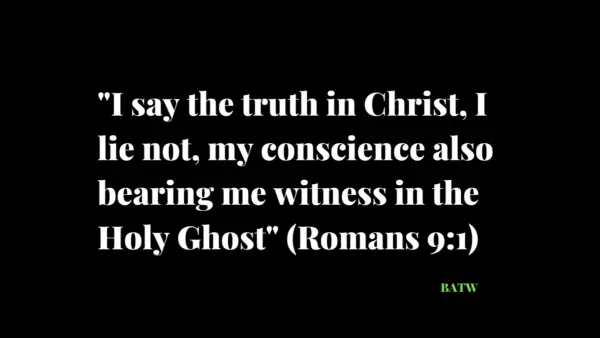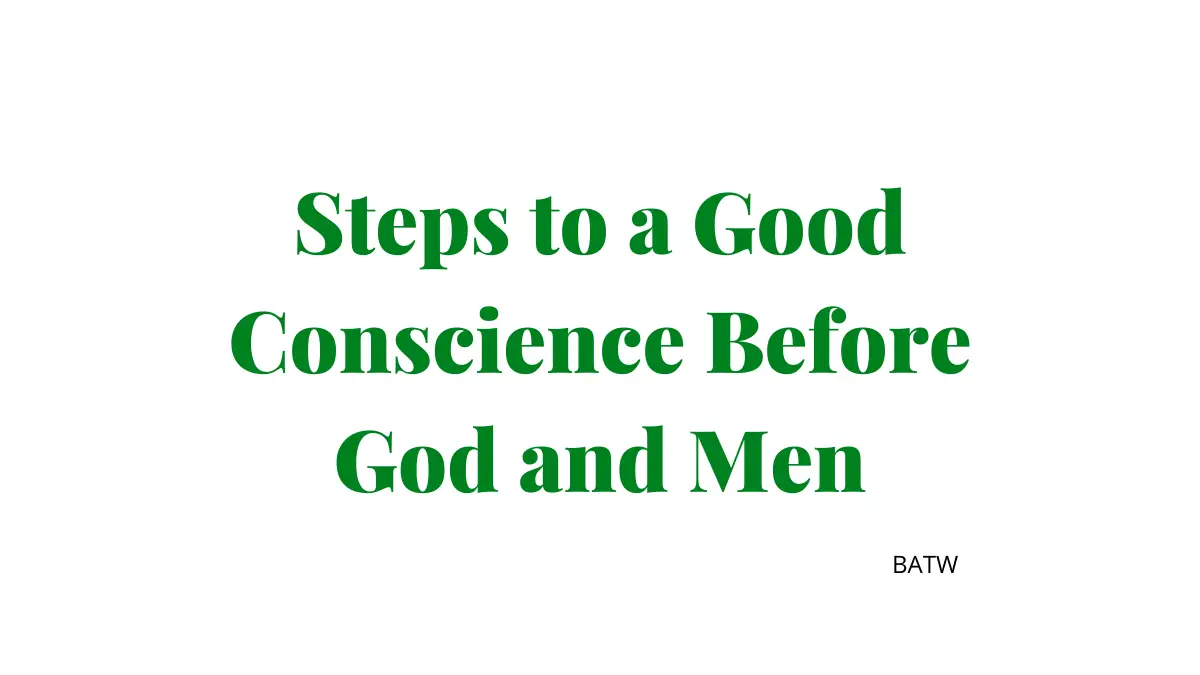Good Conscience in the Old Testament Scriptures
Last week we scrutinized what the conscience meant, but today we desire to explore how to achieve good conscience before God.
Mainly, because none of us was born with one free from wrongdoings.
As we continue with our Book of Acts Bible Study, we are chronicling the adventures of Apostle Paul en route to Rome.
Having a good conscience before God was not universally possible in the time of the Old Testament Scriptures.
Everyone couldn’t achieve it because the way and the procedure to obtain it was not manifested and imperfect, respectively.
Seven Steps to Attain Good Conscience
However, few people attained good consciences before God. These are mainly the Fathers like Abraham, Moses, Jacob, and Jesus to name four.
These are the men of God who laid the foundation of faith in the Lord God Almighty for us to believe in Him and attain to good conscience before Him.
Therefore, by examining what they have done we could recommend what we need to do. We have extracted, from the Bible, seven steps to attain a good conscience towards God and men.
This list is by no means exhaustive, but it’s informative. It includes acknowledging that the Law is inadequate, recognizing that we are all sinners, Christ is the end of the Law, embracing the Savior of the World, holding faith and holding good conscience, obeying Jesus Christ, and watching our conversations.

Step 1 – Remembrance of Sins
The word “conscience” does not appear in the “Old Testament” Scriptures. It’s a “New Testament” phenomenon!
Therefore, under the Old Covenant the nation of Israel, every year, would remember their sins as they perform the annual atonement rituals.
Their consciences were not free from offenses. Even though the High Priest atoned for their sins and the Lord God accepted his atonement, they still felt guilty about their wrongdoings.
They never had consciences free from offenses before God.
“Which was a figure for the time then present, in which were offered both gifts and sacrifices, that could not make him that did the service perfect, as pertaining to the conscience;
Which stood only in meats and drinks, and divers washings, and carnal ordinances, imposed on them until the time of reformation” (Hebrews 9:8-10).
The Law of Moses is Not the Answer
Can you imagine how inadequate, guilty, and powerless Israel felt during the time after the annual atonement ceremony because their consciences were not “perfect” or complete?
Because both the “gifts” and “sacrifices” that they presented to the High Priest couldn’t appease their consciences.
Consequently, the first step towards possessing a conscience void of offenses before God and humanity is acknowledging that the Law of Moses is not the answer.
The Law of Moses is inadequate, for it cannot permanently cleanse the conscience of sins. It cannot furnish us with a good conscience toward God. So, it accuses and condemns us.
“But in those sacrifices there is a remembrance again made of sins every year” (Hebrews 10:3).
Therefore, there was a need for a Divine Intervention!
“For it is not possible that the blood of bulls and of goats should take away sins” (Hebrews 10:4).
Step 2 – Acknowledge That We Are Sinners Before God
Next, is the need to acknowledge that all of humanity has sinned. We were born sinners!
“For all have sinned, and come short of the glory of God” (Romans 3:23).
We’re sinners by proxy. We all inherited the sin of Adam, or “the Sin of the World”, even though we didn’t sin according to the likeness of his transgression (John 1:29).
“Wherefore, as by one man sin entered into the world, and death by sin; and so death passed upon all men, for that all have sinned:
(For until the law sin was in the world: but sin is not imputed when there is no law.
Nevertheless, death reigned from Adam to Moses, even over them that had not sinned after the similitude of Adam’s transgression, who is the figure of him that was to come” (Romans 5:12-14).
We Needed a Divine Intervention
Since we are all sinners and the Law of Moses cannot effectively cleanse us permanently of all our sins, we need a Savior.
The first man Adam is “the figure” or the future representation of “him that was to come” even Jesus Christ.
Adam is a type of Christ!
Jesus Christ is the Divine Intervention, for he is God who became a man. The birth of Jesus Christ is the manifestation of the Savior of the world.
Therefore, on this journey to good conscience before God, we now must acknowledge that we are all sinners and that Christ is our only Savior.
Step 3 – Believe and Declare That Jesus Christ is the End of the Law
Having acknowledged that the Law is inadequate to furnish us with good consciences before God and that we are all sinners, now we are compelled to concede that our Savior, Jesus Christ, is the end of the imperfect Law only if we desire to be righteous before God.
So, there is no route to righteousness outside of Jesus Christ and a pure conscience.
“For Christ is the end of the law for righteousness to [everyone] that believeth” (Romans 10:4).
Note how Christ is NOT the end of the Law for everyone! He’s only for those who believe and those who desire to be righteous!
Note the language! The Bible didn’t say that Jesus was the end of the law but that he “is. So, he continues to be the termination of it up to today.
Before Christ, people became righteous by obeying and practicing the Law. But when he came, he replaced it.
We Cannot Observe the Law and Achieve Good Conscience
Only Believers in Jesus Christ perceive him as superior to the Law of Moses. Not “everyone”!
And for this reason, an enlightened Believer cannot continue to practice the Law of Moses and obey Christ simultaneously. These two are mutually exclusive events! It’s one or the other.
The Law accuses us but Christ excuses us!
And anyone who believes in Jesus Christ will do these two things.
However, in reference to Apostle Paul and his encounter with the Sanhedrin Council and the High Priests, they defiled him!
Consequently, Ananias the High Priest instructed one of the soldiers to slap him on his mouth for speaking ill of them.
“Then said Paul unto [Ananias], God shall smite thee, thou whited wall: for sittest thou to judge me after the law, and commandest me to be smitten contrary to the law?” (Acts 23:3).
Conclusion
Jesus Fulfilled the Law
This was what angered Apostle Paul. They were judging him “after the law” or according to the Law.
They failed to recognize, and today many “Christians” are like then in this respect, that Jesus Christ “fulfilled the law”.
He satisfied and accomplished all the demands and the requirements of it that our consciences could be free and pure.
The blood of animals is inadequate in this respect!
“How much more shall the blood of Christ, who through the eternal Spirit offered himself without spot to God, purge your conscience from dead works to serve the living God?” (Hebrews 9:14).
The Lord describes all the rituals that Israel did before Christ came as “dead works”. And from these the conscience needs purging!
This he did for the world, but all will not benefit from it. In order to benefit, we must believe in Jesus and obey him to reap the advantages of his sacrifice.
The Divine Intervention Creates Good Conscience in Humanity
“For God so loved the world, that he gave his only begotten Son, that whosoever believeth in him should not perish, but have everlasting life” (John 3:16).
Through Jesus, our consciences are free from offenses and undefiled before God. But only through Christ!
There’s no other route to experience this except through believing that Jesus Christ is the Son of God. He is our Savior.
Choose Jesus Christ for he is superior to all.
“Now the end of the commandment is charity out of a pure heart, and of a good conscience, and of faith unfeigned” (1 Timothy 1:5).
So, from Scriptures above, we observe that there is an end to the commandments because Christ fulfilled it.
Nevertheless, with the accomplishing of it comes universal access, for everyone, to love, possess a good conscience, and have faith and all this from a “pure heart” (1 Timothy 1:5).
At the start of this Bible study, I declared that there are seven steps to a good conscience.
However, after assessing the length of it, I decided to present three steps now and the other four in next week’s Bible study.
I didn’t want to make this Bible study too long because these days many people desire shorter material.
So, stay tune until next week when we will finish this! Blessings!
Updated:2020-11-08


